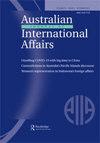探究菲美关系持续存在的原因。《菲美同盟》:关注1951年《菲美同盟》的变化要点。共同防御条约(MDT)
IF 1.8
3区 社会学
Q2 INTERNATIONAL RELATIONS
引用次数: 0
摘要
摘要本文探讨了美国和菲律宾之间的《菲美共同防御条约》(MDT)是如何成为两国联盟的基石的。1992年,在菲律宾参议院(以12票对11票)拒绝延长基地停留时间后,美国军队撤出了基地,MDT自此成为菲美安全关系的后备基础。然而,MDT没有详细说明美国对菲律宾国防的承诺。MDT在新千年的第一个和第二个十年一直是争论的焦点,尤其是当中国开始对南中国海的大部分地区主张其广泛的主权主张时。最终,这两个盟国做出了必要的调整,将MDT从单纯的协商协议转变为安全关系的唯一基石。最后,文章认为,菲律宾和美国能够通过应用金发姑娘原则来最大限度地提高其联盟的有效性和相关性——既不太冷也不太热——美国将其对菲律宾的安全承诺具体化,两党共同承诺谨慎应对中国的海洋扩张主义,可靠和负责任。本文章由计算机程序翻译,如有差异,请以英文原文为准。
Exploring the factors behind the persistence of the Philippine-U.S. alliance: a focus on the changing gist of the 1951 Philippine-U.S. Mutual Defence Treaty (MDT)
ABSTRACT This article examines how the Philippine-U.S. Mutual Defence Treaty (MDT) between the U.S. and the Philippines became the cornerstone of the two countries’ alliance. When the American forces withdrew from their bases in 1992 after the Philippine Senate (by a vote of 12 to 11) rejected the extension of the bases’ stay, the MDT has since served as the fallback basis of the Philippine-U.S. security relationship. However, the MDT does not spell out the details of the U.S. commitment to the Philippine defense. The MDT has been the bone of contention during the first and second decades of the new millennium, especially when China started asserting its expansive claims over much of the South China Sea. Eventually, the two allies made the necessary adjustments to transform the MDT from a mere consultative agreement to the sole bedrock of security relations. In conclusion, the article argues that the Philippines and the U.S. were able to maximize the effectiveness and relevance of their alliance by applying the Goldilocks principle—neither too cold, neither too hot—with the U.S. concretizing its security commitments to the Philippines and the two parties committing themselves together in addressing China’s maritime expansionism cautiously, reliably, and responsibly.
求助全文
通过发布文献求助,成功后即可免费获取论文全文。
去求助
来源期刊

Australian Journal of International Affairs
INTERNATIONAL RELATIONS-
CiteScore
3.20
自引率
13.30%
发文量
44
期刊介绍:
AJIA is the journal of the Australian Institute of International Affairs. The Institute was established in 1933 as an independent and non-political body and its purpose is to stimulate interest in and understanding of international affairs among its members and the general public. The aim of the Australian Journal of International Affairs is to publish high quality scholarly research on international political, social, economic and legal issues, especially (but not exclusively) within the Asia-Pacific region. The journal publishes research articles, refereed review essays and commentary and provocation pieces. ''Articles'' are traditional scholarly articles. ‘Review essays’ use newly published books as the basis to thematically examine current events in International Relations. The journal also publishes commentaries and provocations which are high quality and engaging pieces of commentary, opinion and provocation in a variety of styles. The Australian Journal of International Affairs aims to analyse international issues for an Australian readership and to present Australian perspectives to readers in other countries. While seeking to stimulate interest in and understanding of international affairs, the journal does not seek to promote any particular policies or approaches. All suitable manuscripts submitted are sent to two referees in a full ''double blind'' refereeing process.
 求助内容:
求助内容: 应助结果提醒方式:
应助结果提醒方式:


